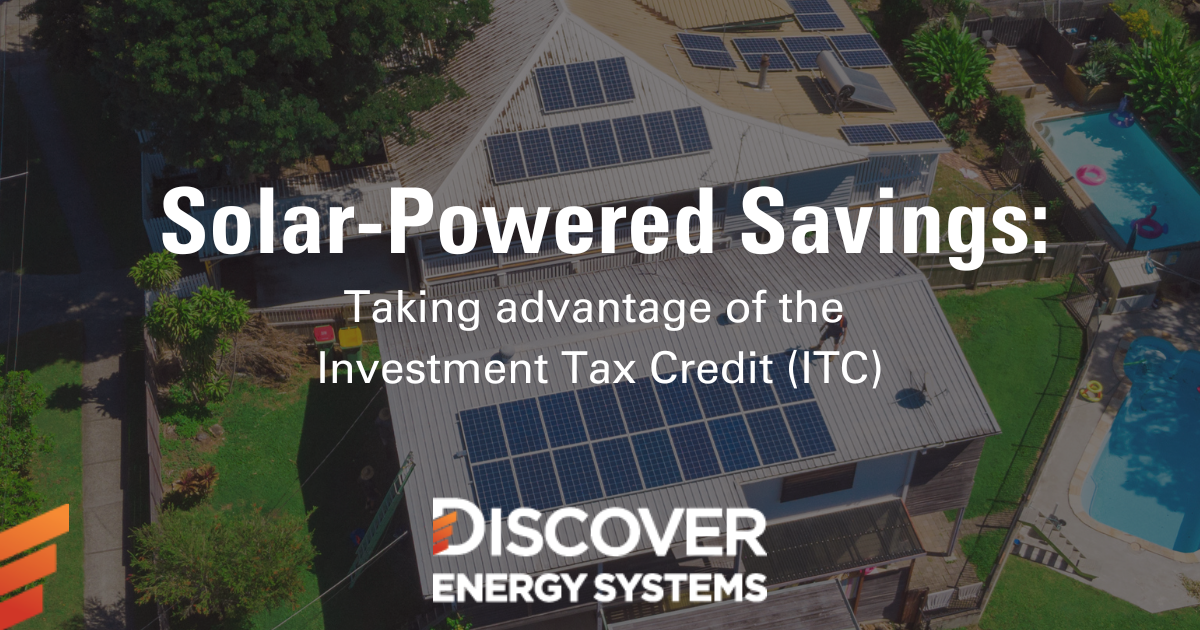Ready to connect with a solar installer?
Contact us to get connected with a solar installer near you.

In the ongoing fight against the climate crisis, clean energy tax credits, such as the Investment Tax Credit (ITC), play a crucial role. These tax credits pack a big punch for homeowners looking to adopt cleaner and more sustainable energy solutions, including solar power and solar power plus storage systems.
Part of President Biden’s Inflation Reduction Act (IRA), the ITC, along with other tax incentives, holds the potential to steer the United States toward a cleaner, more sustainable energy future. Initial estimates foresaw the IRA contributing at least $370 billion to climate action, with $257 billion earmarked for tax credits. However, recent reassessments suggest that these projections might be conservative, hinting at the possibility of these investments being three times more substantial. For those who choose to take advantage of the ITC, the sky is the limit, as there are no value or lifetime caps.
The ITC facilitates new investment in clean energy installations by allowing individuals and corporations to reduce their tax liability by 30% of the investment's cost. This reduction is dollar-for-dollar; for example, claiming a $1,000 federal tax credit would reduce federal income taxes due by $1,000. If the credit exceeds tax liability for the year, the unused portion can be “rolled over” to future years so long as the credit remains in effect. A diverse range of projects are eligible for the ITC, including manufacturing, energy efficiency, and renewable energy initiatives (such as solar power systems).
To qualify for the baseline 30% credit, the project must meet the following requirements for labor standards:
ITC Eligibility Criteria: Who Can Benefit?
The beauty of the ITC lies in its accessibility. Unlike some incentives that cater exclusively to corporations, the ITC can be claimed by a wide range of entities, including individuals, nonprofits, and households. For homeowners, the ITC opens doors to reducing tax liability, making solar energy not only an environmentally conscious choice but a financially savvy one as well.
The ITC can be claimed for improvements to a primary residence, regardless of whether the applicant rents or owns. It's important to note that landlords or other property owners who do not reside in the home are ineligible to claim the credit.
Eligibility Criteria: How to Leverage the ITC
The Investment Tax Credit and its Bonus Credits are a game changer for the economics of solar and solar+storage projects. Many projects are eligible for a baseline credit of at least 30% of the total solar or solar+storage project costs. By incorporating and stacking one or more bonus credits, some projects may even qualify for up to 70% of eligible project costs.
To take advantage of the ITC, homeowners must ensure their solar equipment meets specific criteria:
Meeting these criteria lays the foundation for a successful claim of the ITC, ensuring that an investment in solar energy is not only environmentally conscious but also financially rewarding. Note that the credit must be claimed the tax year when the equipment is installed, not the year of purchase. Always check the latest IRS guidelines or consult with a tax professional for the most current information.
In addition to the baseline 30% credit, the ITC also offers four bonus credits that can significantly enhance the financial benefits of your solar project. Stacking these bonus credits on top of the base credit allows for coverage of up to 70% of eligible project costs.
The Four Bonus Credits:
If met, this increases the value of the ITC from 6% of eligible project costs to 30%.
Offers between a 2% and 10% bonus credit for projects that meet domestic manufacturing requirements.
Offers 10% for projects located within an “energy community,” which is defined as:
Offers a credit of between 10 and 20% of eligible project costs for qualified solar and wind projects built in or that benefit low-income communities.
All four bonus credits are eligible for direct pay, meaning that non-taxpayers, such as local governments, government agencies, and nonprofit organizations, can receive their value as a cash payment.
Understanding and strategically leveraging these bonus credits can make a substantial difference in the overall economics of your solar and solar+storage projects.
Solar energy incentives change frequently and will not be available indefinitely. Solar incentives are developed in order to "incentivize" early adoption. In other words, the installation of a solar power system should be included in planning sooner rather than later for homeowners who want to lower their upfront solar equipment costs, increase their energy savings, lower their operating expenses, and reduce their carbon footprint.
Tax credits, including the ITC, are powerful tools not only to reduce tax liability but also to stimulate investment in clean energy. While they may pose certain challenges in terms of eligibility and application, the potential financial benefits make them a compelling option for those considering solar projects.
If you are thinking about investing in a solar project that might qualify for the ITC, you should consult with a tax professional to ensure you are eligible and understand the specific rules and requirements. They can provide personalized guidance, ensuring that you navigate the complex tax regulations with confidence and maximize the financial advantages available.
Installing a solar power system and taking advantage of the ITC is not just a wise financial move; it's a strategic and sustainable investment in the future.
Contact us to get connected with a solar installer near you.
Articles:
https://www.energy.gov/eere/solar/homeowners-guide-federal-tax-credit-solar-photovoltaics
https://www.cleanegroup.org/how-to-make-the-most-of-the-investment-tax-credit-applying-for-bonus-credits/
https://www.carboncollective.co/sustainable-investing/investment-tax-credit-itc
https://www.thehartford.com/business-insurance/strategy/business-tax-credits/investment-tax-credits
https://impactcp.org/insights/what-are-investment-tax-credits/
https://turbotax.intuit.com/tax-tips/going-green/federal-tax-credit-for-solar-energy/L7s9ZiB4D
https://www.marketwatch.com/guides/solar/federal-solar-tax-credits/
IRS:
https://www.irs.gov/credits-deductions/residential-clean-energy-credit
https://www.irs.gov/pub/taxpros/fs-2022-40.pdf
https://www.evergreenaction.com/blog/what-are-clean-energy-tax-credits
Find Policies and Incentives by State: